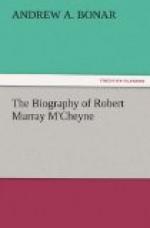[13] [Greek: Ego men de katanoon tou andros ten te sophian kai ten gennaioteta oute me memnesthai dynamai autou, oute memnemenos me ouk epainein. Ei de tis ton aretes ephiemenon ophelimotero tini Sokratous synegeneto ekeinon ego ton andra axiomakariototaton nomizo.]
I find written on the leaf of one of his note-books, a short memorandum: “Rules worth remembering.—When visiting in a family, whether ministerially or otherwise, speak particularly to the strangers about eternal things. Perhaps God has brought you together just to save that soul.” And then he refers to some instances which occurred to himself, in which God seemed to honor a word spoken in this incidental way.
In this spirit he was enabled for nearly three years to give his strength to his Master’s service. Sickness sometimes laid him aside, and taught him what he had to suffer; but he rose from it to go forth again to his joyful labors. Often, after a toilsome day, there were inquirers waiting for him, so that he had to begin work afresh in a new form. But this was his delight; it was a kind of interruption which he allowed even on a Saturday, in the midst of his studies. He was led to resolve not to postpone any inquirers till a future time, by finding that having done so on one occasion at a pressing moment, the individuals never returned; and so alive was he to the responsibilities of his office, that he ever after feared to lose such an opportunity of speaking with souls at a time when they were aroused to concern. Busy one evening with some extra-parochial work, he was asked if any person should be admitted to see him that night. “Surely—what do we live for?” was his immediate reply. It was his manner, too, on a Saturday afternoon, to visit one or two of his sick who seemed near the point of death, with the view of being thus stirred up to a more direct application of the truth to his flock on the morrow, as dying men on the edge of eternity.
We have already observed that in his doctrine there was nothing that differed from the views of truth laid down in the standards of our church. He saw no inconsistency in preaching an electing God, who “calleth whom He will,” and a salvation free to “whosoever will;” nor in declaring the absolute sovereignty of God, and yet the unimpaired responsibility of man. He preached Christ as a gift laid down by the Father for every sinner freely to take. In the beginning of his ministry, as he preached the fulness of the glad tidings, and urged on his people that there was enough in the glad tidings to bring direct and immediate assurance to every one who really believed them, some of his flock were startled. For he ever preached, that, while it is true that there are believers, like Heman or Asaph, who do not enjoy full assurance of the love of God, yet certainly no true believer should remain satisfied in the absence of this blessed peace. Not a few had hitherto been accustomed to take for granted that they might




